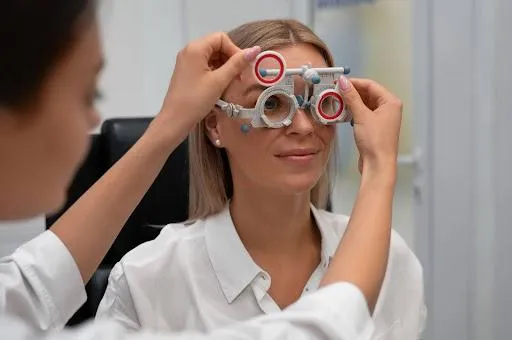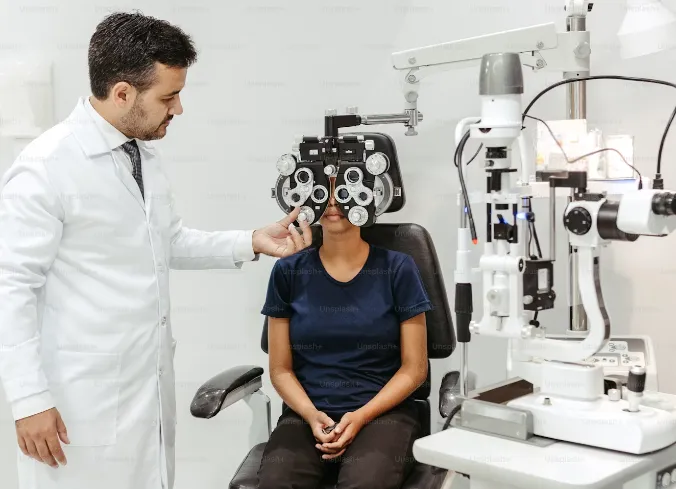Vision and Hormones
How Hormonal Changes Impact Vision in Women
FSDAVCFEBFEVSDDVFSD
FSDAVCFEBFEVSDDVFSD
FSDAVCFEBFEVSDDVFSD
Hormonal Fluctuations and Vision Changes
Hormonal changes during life stages like pregnancy, menopause, and aging can impact a woman's vision, leading to issues such as dry eyes, changes in prescription, and more severe conditions that may require specialized eye care. Understanding these hormonal influences helps women take proactive steps in managing eye health.
During pregnancy, fluctuations in estrogen and progesterone can cause dry eyes, blurred vision, and temporary prescription changes. Expectant mothers should consider regular eye exams and adjust their eyewear needs as needed. To learn more about maintaining eye health during pregnancy, explore our detailed guide on Pregnancy Eye Care
Hormonal changes during life stages like pregnancy, menopause, and aging can impact a woman's vision, leading to issues such as dry eyes, changes in prescription, and more severe conditions that may require specialized eye care. Understanding these hormonal influences helps women take proactive steps in managing eye health.

During pregnancy, fluctuations in estrogen and progesterone can cause dry eyes, blurred vision, and temporary prescription changes. Expectant mothers should consider regular eye exams and adjust their eyewear needs as needed. To learn more about maintaining eye health during pregnancy, explore our detailed guide on Pregnancy Eye Care

Impact of Menopause on Vision Health
As women approach menopause, declining estrogen level can cause various physical changes, including those that affect eye health. One of the most common issues is dry eye syndrome, which occurs due to reduced tear production. This condition can lead to discomforts such as irritation, redness, and blurred vision, affecting daily activities like reading or driving.
In addition to dry eyes, some women may notice changes in their vision prescription during menopause. These shifts may require updates in eyewear or contact lenses to maintain clear vision. Regular eye exams become more important than ever during this time, as they can help monitor any changes and adjust prescriptions as needed.
Addressing these symptoms early with the help of an eye care professional is essential to prevent more severe complications. By discussing symptoms with a professional, women can explore various treatment options, such as prescription eye drops, nutritional supplements, or lifestyle adjustments. For more detailed insights into managing these changes effectively, Contact us to know more about Menopause and Eye Health to learn more about tailored eye care strategies during menopause.
Aging and Eye Health in Women

Aging brings its own set of challenges for women’s vision care. The natural aging process can cause the lenses in the eyes to harden, leading to presbyopia or difficulty focusing on close objects. Coupled with hormonal changes, these effects can exacerbate vision issues. Women are also at a higher risk for certain eye conditions, such as dry eye syndrome and cataracts, particularly after menopause. Regular eye exams and preventive care are crucial in addressing these age-related vision changes and maintaining long-term eye health."
Women over the age of 40 should consider annual comprehensive eye exams to monitor any potential changes and detect early signs of age-related eye diseases such as glaucoma or cataracts. Our Comprehensive Eye Exams for Seniors page provides more information on what to expect during these exams and how they help in early detection.

Hormonal changes can lead to several common vision problems for women, such as dry eye syndrome, blurry vision, and even double vision. These issues often arise during periods of hormonal fluctuation, including pregnancy, menopause, and aging. For instance, a decrease in estrogen levels can result in reduced tear production, causing dry eyes and discomfort. Blurry or double vision can also occur due to changes in the cornea's shape or lens flexibility, which affects the eye's ability to focus properly.
In some cases, the hormonal impact on eyes can lead to more severe conditions like macular degeneration, a leading cause of vision loss. Being aware of these risks and staying vigilant with regular eye check-ups is crucial to prevent or minimize the effects of these changes. Early detection and treatment can help manage symptoms and protect long-term vision. To learn more about various eye issues and their treatments, visit our Eye Conditions page for a comprehensive guide.
Managing Dry Eyes Effectively
Dry eyes are a common issue for women experiencing hormonal changes, often caused by reduced tear production or poor-quality tears. These changes can be further aggravated by factors such as aging or menopause, leading to symptoms like irritation, redness, and a gritty feeling in the eyes. Without proper management, dry eyes can affect daily activities and overall quality of life.
Effective treatment options for managing dry eyes may include using artificial tears, prescription medications, or making specific lifestyle adjustments, such as increasing hydration and reducing screen time. In more severe cases, consulting with an optometrist is crucial to explore advanced treatments, such as punctal plugs or specialized eye drops. For a detailed overview of available treatments, check out our Dry Eye Treatment guide, which provides comprehensive information on how to alleviate symptoms and maintain eye comfort.
When to See an Eye Doctor
Knowing when to see an eye doctor is crucial for managing vision problems linked to hormonal changes. Persistent symptoms like dry eyes, blurry vision, or discomfort are signals to consult a professional.
Regular eye exams are essential for detecting changes in vision and identifying underlying conditions that may need prompt attention. Women, in particular, should prioritize eye checks during significant life stages, such as pregnancy and menopause, when hormonal fluctuations are more pronounced.
Routine eye checks help in early diagnosis and effective management of potential eye health issues. For more information on the benefits of regular eye exams, visit our Routine Eye Exams page and learn how these check-ups can support your eye health.
Knowing when to see an eye doctor is crucial for managing vision problems linked to hormonal changes. Persistent symptoms like dry eyes, blurry vision, or discomfort are signals to consult a professional.
Regular eye exams are essential for detecting changes in vision and identifying underlying conditions that may need prompt attention. Women, in particular, should prioritize eye checks during significant life stages, such as pregnancy and menopause, when hormonal fluctuations are more pronounced.

Routine eye checks help in early diagnosis and effective management of potential eye health issues. For more information on the benefits of regular eye exams, visit our Routine Eye Exams page and learn how these check-ups can support your eye health.

Choosing the Right Eye Care Professional
Choosing the right eye care professional is crucial for effectively managing vision changes related to hormonal fluctuations. Women face unique vision challenges during life stages like pregnancy, menopause, and aging, which require a tailored approach to eye care. A knowledgeable provider who understands these specific needs can help in early diagnosis and appropriate treatment.
When selecting an eye care professional, consider their experience with issues commonly faced by women undergoing hormonal changes, such as dry eyes, fluctuating vision prescriptions, and age-related eye conditions. An expert familiar with these conditions will be better equipped to offer guidance and treatments that address both immediate symptoms and long-term eye health.
At Kleinwood Vision, our Experienced Eye Doctors are well-versed in handling cases involving hormonal impact on vision. They can provide personalized care plans that cater to the unique needs of women at every stage of life. Whether it's managing dry eyes during pregnancy, adjusting prescriptions due to menopause, or monitoring for age-related conditions, our specialists offer comprehensive support.
By choosing a provider who understands the intricacies of hormonal changes and their impact on eye health, women can feel confident they are receiving the best possible care. The right eye care professional will not only address current issues but also help prevent future problems, ensuring optimal vision health through all phases of life. For more information on how our team can assist with your vision care needs, explore our page on Women’s Vision Care and discover the difference tailored care can make.
Preventive Measures for Healthy Vision
Preventive measures are vital for maintaining eye health, particularly during periods of hormonal fluctuations. Simple steps such as eating a balanced diet rich in vitamins, staying hydrated, and avoiding excessive eye strain can significantly reduce the risk of vision problems. These habits support overall eye function and help manage common issues like dryness and irritation. Additionally, incorporating regular physical activity can improve blood circulation to the eyes, further promoting optimal eye health and reducing the risk of developing age-related vision conditions

Preventive measures are vital for maintaining eye health, particularly during periods of hormonal fluctuations. Simple steps such as eating a balanced diet rich in vitamins, staying hydrated, and avoiding excessive eye strain can significantly reduce the risk of vision problems. These habits support overall eye function and help manage common issues like dryness and irritation. Additionally, incorporating regular physical activity can improve blood circulation to the eyes, further promoting optimal eye health and reducing the risk of developing age-related vision conditions
Regular use of lubricating eye drops can help alleviate mild symptoms of dry eyes, a common concern during hormonal changes. For those seeking more comprehensive support, we offer a variety of vision care services designed to protect and maintain eye health. Taking proactive steps today can prevent more severe issues in the future and ensure clear vision throughout life.
Regular use of lubricating eye drops can help alleviate mild symptoms of dry eyes, a common concern during hormonal changes. For those seeking more comprehensive support, we offer a variety of vision care services designed to protect and maintain eye health. Taking proactive steps today can prevent more severe issues in the future and ensure clear vision throughout life.
Proactive Eye Health for Women
Taking a proactive approach to eye health is essential for women experiencing hormonal changes. Regular eye exams are crucial for monitoring any shifts in vision and detecting potential issues early. Staying informed about how hormones can affect vision helps in identifying symptoms like dryness, blurry vision, or changes in prescription, allowing for timely intervention. This proactive approach ensures that women can address any emerging issues before they impact overall quality of life.
Consulting with specialized eye care providers ensures that women receive tailored care that addresses the specific challenges posed by hormonal fluctuations. Understanding the connection between hormones and eye health empowers women to take proactive steps to maintain clear and healthy vision throughout their lives. By prioritizing regular check-ups and seeking professional advice, women can manage their eye health effectively and prevent more serious conditions from developing.

Contact Info
Hours of Operation
Mon - Fri | 9:00 AM - 5:00 PM
Sat - Sun | Closed
Holiday Hours: We are closed for the following holidays: New Years Day, Memorial Day, Independence Day, Labor Day, Thanksgiving Day, Christmas Day
© 2026 Kleinwood Vision. All rights Reserved.


